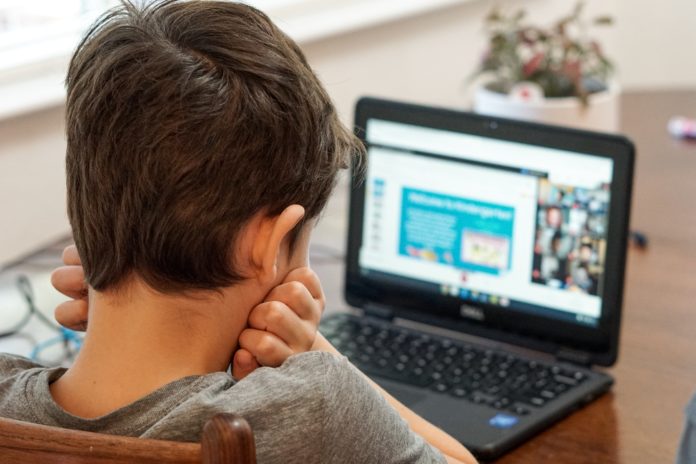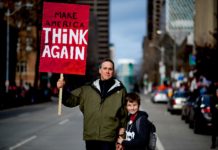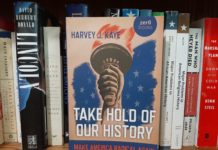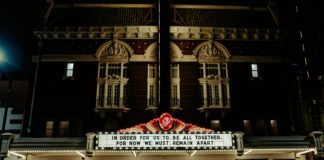What follows below, synthesized and condensed, are brief, one-minute clips of the arguments made by a broad spectrum of panelists from an online discussion recorded Sept. 4. Also, we include here brief, edited text summaries of the insights offered by our eight panelists and our moderator, Dr. Richard J. Reddick of the University of Texas at Austin.
As Austin, and many schools around the nation and world resume in some fashion this week, the broad argument expressed by this panel is that COVID has posed more than the question, ‘to open or not to open.’ Rather, COVID-19 has forced a greater reckoning of what America seeks to accomplish with its education system, schools, classrooms, teachers and students that were in a crisis before the virus reached our shores.
The full roundtable video is available here. To read and see the highlights, we begin with the clip and summary views of moderator Reddick:
‘How do we become a morally righteous and correct society?‘
Rich Reddick – Associate Dean and Professor, College of Education at UT – Austin
… I’m Rich Reddick. I’m a full professor and associate dean for equity, community engagement and outreach at the College of Education, University of Texas at Austin. I’m also a parent. Besides being a parent, I’m a former fourth grade teacher and middle school teacher.
… And I am a product actually of AISD (Austin Independent School District) schools. We have a lot of different experiences here… we have intersecting identities, we’re going into class, we’re managing our families and we’re working as advocates…
… Folks who are interested in education as a concept have to understand that education, intermingles, abuts, intersects and comes together with other functions in life — primarily health, housing, the financial picture and so forth as the school year starts, or as in some cases already started…
… What is actually our mission here? What are we trying to accomplish here? If we’re trying to satisfy a legislative mandate, or that’s our primary objective, then we’re losing something else as well.
…. I want to be pragmatic and realist. I don’t want to act like we don’t have to make those considerations. But when those considerations become the primary thing that drives our decision making process, we may be going a step too far.
… I’m really concerned about what will be the long term effects of the pandemic. I’m talking not just about what happens in education, but what happens to people’s health and so on and so forth. I think the temptation is going to be, once we are able to go back, because the pandemic is either under control or we have a vaccine, that we just move on…. What COVID has really done is exposed that the social safety net is in tatters. It’s been failing for the last 40 to 50 years…
… We need to have a really intense focus on resisting this idea of saying, once things are back to normal, that we cannot worry about the inequities you are all talking about. In fact, we should lean into them. It’s an opportunity to reconfigure and think about what our priorities are…
… I’m thinking about just the exacerbation of inequality in a time when we have unimaginable wealth… Just look around and look at some of these metrics we use to measure wealth, and the folks who are doing quite well in the society compared to the folks who are not. No democratic society should be applauding that. It’s shameful…
… I want to say what a fantastic panel this has been. There’s so much knowledge and information and humility in this group. And I think my parting thought is… really about think about the moral aspects of what we’re talking about. Let’s not talk right now about educational inequity. Let’s not talk about housing and equity. Let’s talk about moral inequity. Let’s talk about the fact that if you hold privilege in society right now, you’re morally implicated in the situation…
… At some point, you have to question whatever system you believe in. Most systems have at their core, some expression that there is justice. So my challenge is how do we become a morally righteous and correct society? I’m thinking about Gloria Ladson-Billings, and how she talks about the moral debt this country has. It’s been exacerbated by slavery, by Jim Crow, by prejudice, by discrimination and by the exclusion of people, Native Peoples, people with disabilities, you name the groups, women LGBTQ queer people and so…
…. So I really want to figure out a way to get this message out to people who wouldn’t normally listen to this because you all very eloquently expressed, why it is you have the perspectives that you have…
… Inclusion is radical and you know, (Martin Luther) King thought about radical love. Let’s go there, right? I want to thank you once again, the panel for everything you’ve said…
‘This pandemic has exposed that this country is rotten to its core’
Cuitlahuac Guerra – Physics teacher in the Pflugerville School District, parent
… The COVID-19 crisis magnifies and amplifies issues that already existed, issues that are deep seated, fundamental and systemic. This country was founded on values of white supremacy. This country was founded on stolen land and built with slave labor. And so we witness the manifestation of that foundation playing out in schools that are now centers of food distribution for communities of color. We see Black and brown families that aren’t paid well enough in this capitalist society to be able to afford food and afford health care. And these are the essential workers…
… This pandemic has exposed that this country is rotten to its core in terms of providing for the welfare of its people. We’ve exposed a need for complete systemic change…
… On Sept. 11, of all days, I will be asked to return to the school building. So there’s a lot on my mind…
… As a teacher, I usually get face to face in person and bring a lot of energy. Sometimes it’s explosive, literally, because I teach physics and we literally make things blow up. But with this online teaching, I’m realizing that when I’m hosting a Zoom of 28 young people, that really I need to give them space to connect with each other. I worry there is not time and space for that…
… And I am worried about my own kids’ safety and education. One of my children is supposed to start kindergarten. That’s a big fear. They can’t go to the carpet and read a book with their classmates. They can’t play outside at recess. They can’t do arts and crafts together. It’s going to be virtual, it’s going to be over the computer, and I want to be there for them. I want to be next to them when they’re trying to learn to read but I’m asked to go back into the classroom…
… I’m asked to to put my safety at risk, and at the same time asked to not be there for my own child. I’m not going to be my full self, I’m not going to be able to bring 100 percent of my capacity as a teacher, when I’m being forced to choose between my own children and the children I’m supposed to serve. That’s a very difficult position…
… Now more than ever, we have an opportunity. And everyone sees our society and education system for what it is. This means now we have to take that opportunity to change it into what we want it to be and what we think it should be — a society that puts people over profits that puts our students and their needs above test scores and above funding debates…
… We’ve gone just a few months and nothing has changed. Nothing might ever change. We know what needs to happen. But is there enough goodwill for it to happen? I don’t think so. I’m being pessimistic but realistic…
‘A pandemic silver lining is that we have got to shake things up’
Laura Yeager – Director, Just Fund It Texas
… I’m a parent of three kids. My youngest just graduated high school and now two of mine are in college and we’re navigating how that works. But I’m involved from a big picture standpoint. I spend a lot of time advocating for funding our public schools at the legislature, for reducing the focus on high stakes standardized testing, for getting people to vote. And I’ve been involved every morning since March with the Community Resilience Trust here in Austin, which is a group of leaders in Austin trying to elevate the voice of the Black and brown community in our city. And I’ve really seen how COVID has exacerbated the inequities…
… A lot of the decisions that are really affecting people on the ground are being driven high up at our presidential level and our gubernatorial level. And there’s some stuff we can do and do better, but there’s some that were really stuck. Because while all this is going on up here, the schools are asking, “are we going to get funded..?”
… Meanwhile, all the parents are scrambling. Especially women of color, who are working, who don’t have childcare, the pandemic exacerbates how our country’s healthcare system is weak and not accessible to everyone. We don’t have a childcare system. All these inequities that are coming to the surface…
… And while it’s not a great time for anyone, I am hoping a plus will be the racial sort of awakening among White people so that we really can make some changes. The fact that kids were actually able to learn for the sake of learning, not to get a grade or beat someone else is a huge change that I hope we can make in our system, because supposedly we’re making lifelong learners…
… What really everyone’s yearning for is human interaction, which we can’t have right now. And I think it’s forcing people to be intentional about connecting…
… I really think the young people our only hope for the future. They care about the planet, they care about equity, they care about humanity, they do not see a lot of the distinctions that we have built into our structure. And while I am revolutionary, and I’m sure I’m going to get put on a bunch of lists that I’m probably already on, I’ve been wondering for a long time, what revolution we’d have first: whether it was going to be race, whether it was going to be gender, whether it was going to be the economy? And really Black women lead at the intersection of all of these issues….
… So I’m looking to Black women and to the young people to take power and let me follow along and be supportive. But I really think that a lot of groups, especially our got kids … they are not interested in incremental change, we need a wholehearted change. And that is the only silver lining that I see in this pandemic, that we have got to shake things up. And I think people who didn’t really notice it before maybe are. That’s my hope…
‘This is the excuse we were waiting for to make drastic changes’
Lorena Germán – Activist, parent, and Co-Founder of Multicultural Classroom
… In addition to co-founding the Multicultural Classroom, I’m also a classroom teacher. When the pandemic happened, it really did change everything that teaching, at least for me, was supposed to be.
… What does it mean to go back to school, whether it’s virtual or in person? Even to ask that we go back in person reveals the intersection of so many of these ‘isms’… for folks of color in particular…
… All the reports have shown a disproportionate impact and that we are disproportionately dying from this virus. And then this profession of education is primarily women. So now we have the issue of gender as it intersects with the situation. And then you are asking many who are mothers, or caretakers of other people, to put our lives at risk. So we see the way that these ‘isms’ are playing and getting mixed into this entire situation…
… This isn’t just like some invisible virus; we have lost people. I remember in March the reality of losing my grandfather to COVID on a Saturday and going to teach on Monday…
… This pandemic reveals to us not only inequities, but the intersection of all of these systems in a way that we really can’t unsee… things that for so many of us, who are marginalized, were already so obvious. I would hope that as a nation we can we can start to open up our eyes and really have honest conversations….
… One of the things that is a little scary about COVID is that we only are beginning to learn what some of the least recent long term effects are. It hasn’t been five years, so we don’t know what this does to people’s bodies after they have recovered. But from my little bit of research and reading, and the unfortunately numerous people who I know who have survived COVID, one is fatigue. There’s this fatigue that goes beyond, “I’m tired I need a nap” and this like lingering headache… My point is that I’m thinking about the physical, let’s call them scars of COVID…. We are going to have to become a society that is considerate of people’s health, instead of simply their production.
… What about the ones who have chronic illnesses? Those who maybe for a long time, have already asked for accommodations, and it was just something that didn’t exist in our national imagination? Well, it’s going to have to exist now moving forward…
… For teachers this is the excuse that we were all waiting for, to make the drastic changes. There were always reasons not to teach toward social justice. There was always reasons not to teach in anti-racist ways. And here we are. Look at this country and look at the nation, it’s burning. I have to do something about it. This is the moment for those that have not been doing this work…
… You’re late, but welcome. Let’s go. The train is moving.
‘We ask schools to do everything as we’ve underfunded them’
Nina Wilson – UT Professor and former AISD Spanish Teacher
… I am a teacher by heart. I’ve been teaching for a quarter of a century. I have two Black daughters who’ve gone through this system. When March hit, everybody was talking about how much we lost. And I promise you, we gained. Because my kids were being traumatized through the educational system every day, and they were happier doing work at home…
… But a couple of things that are pressing for me. I’m sending students who are prospective teachers into classrooms. And I don’t know that I want to be there right now. I’m conflicted with that… I have a student who’s in a private school right now and they are full mode — kids changing classes, face to face all day, every day. As a parent, and as a professional, I’m conflicted because I know that that’s not something that I would want optimally, in the midst of a pandemic. I’m worried about options that teacher have in not being in a classroom where we feel unsafe, versus the tradeoff of deciding between your livelihood and your life…
… The other side of that coin that makes it challenging for me is I know that I sit in a place of privilege and that my kids are able to sit in their rooms and close their door. They’re fed every day and they can do their work…
… We know about this food insecurity. And we know that there are discrepancies. This gives us an opportunity to do something about it…
… What is the role of school? I thought we were supposed to be about educating. I thought it was about learning, opening critical thinking, giving kids skills so that they’re able to do what they need to do. So what we’ve seen is that schools are hubs for food. So food insecurities, now we’ve asked the schools to take care of kid’s ability to eat. That’s a community issue and our community needs to step up and deal with food. That’s what they should be doing, not schools…
… Second, daycare. We are not a daycare. And that’s what we’re being asked to do. We are not about being a day care; we’re supposed to be educating. So if daycare is an issue, our community needs to step up and have daycare be something that they take on. In addition to that safety. We’ve been concerned about kids who’s who are being abused, and those numbers have been skewed by this pandemic…
… So we are having a hard time of knowing who’s being abused in their homes. There needs to be some other agencies and entities stepping up to take care of that. We’ve asked schools to do everything as we’ve underfunded them. We need to come out of this with the community stepping up and doing its role so that the school can be about educating instead of doing everything for the community…
… We can come up with solutions, and it might feel uncomfortable. But everything feels uncomfortable until it’s comfortable. We can do this. We’ve got to. We owe it to our kids…
‘All the problems have been magnified and amplified’
Lisa Flores – Parent and disability advocate
… I’m multicultural, multilingual and I have two children with disabilities. I have a perspective that is unusual in that I see most things through a lens of disability access…
… Every year, I work 10 times harder for what everybody else takes for granted. Most people sign up their kids for school and they drop them off and they trust that decisions will be made and their kids will be included. That has not been my experience… Every year I prep by making an ‘all about me’ sheet for my students to get buy-in from educators that my student is one of their students…
… I will be doing that this year as well…because frankly, there are a lot of barriers for students with disabilities. And in this COVID conversation, a lot of the planning is not including disability…
… Having your camera on… my son can’t pay attention to 20 people at once… I’m preemptively accepting that my student isn’t going to make a ton of progress this year, which is saddening, but it’s also honest…
… I’m doing what I can to be the best at-home instructor, but also realizing that there are significant challenges for my students…
… Now everybody’s thinking about accessibility and about access. We’ve been fighting for this since the passage of the ADA (Americans With Disabilities Act of 1990). So I think a lot more people are understanding the point of view of people who have been chronically marginalized…
… Long term, we could look at a new funding system that hopefully is based on enrollment… When we talk about school funding, I mean school funding for all students… special education funding is still based on placement based on segregation. You get money according to where you learn, the more segregated you are, the more money you will get. And I fear that because of the COVID crisis, that funding or that goodwill to change education funding, will not be there because of ableism…
… All the problems that have existed have been magnified and amplified. I like to just challenge… the actual delivery of educational services. Who is learning? Who is it designed for? Who is able to access and and with what outcomes? We need to understand how schools are going to make it up to students that they failed. I know people who have children who are on the verge of being hospitalized because they can’t handle not being in a predictable, structured setting…
… My worry is that because it’s the population we need to make it up to, which is not only disabled students, but marginalized students, Native American students, Black, brown, Latino, refugees… I want there to be thoughtful processes in place to really say, “who did we fail?” And have the bravery to take steps to create systems governance and policies to change…
… I invite all of you to take inventory of who’s there and who’s not there. I guarantee you, if your classmates and your children and your colleagues are lonely, your classmates with disabilities are 10 times more lonely… So please exercise kindness and thoughtfulness and include people who you’ve come into contact with who you may not normally consider….
‘Zoom opens up a new outlet to bring people together’
Natalie Suri – A rising senior at McCallum High School, Austin
… The online school that we had during the spring is going to be very different from the online school we’re going to have now. But in the spring, what I really liked about it was that it was pass/fail. I had more time to focus on how much I love learning, because it’s really easy to get caught up in just the grades. I liked that I could sort of pick and choose more about of what I wanted to study. The hardest part about COVID in school for me is the lack of social interaction. Normally during school, you have interactions with people in your class next to you and I really missed that. I think I usually talk to, like, 30 people a day and now I talked to, like, two people a week, which has been hard…
… Another thing that has been hard is that with all the college stuff at school, I could normally just walk into the counselor’s office and say, “I have this question. I’m worried I accidentally accepted everything without filling it out or something like that.” And they would reassure me. But now since it’s online, it’s a lot more formal, and I have to be a lot more independent, and do things like set meetings up. So, those are a few of the main ways that this has affected me…
… But to add a concern, COVID sort of shines light on inequalities. When students turn on their video… you can see who’s sitting in front of their lake house and then the student who has all their siblings doing things in the background. It makes me think less of students. I struggle, because as a privileged student, I’m trying to figure out where my place is, how I should help, how I should share my resources. And if my voice should be at the table, and I ask myself what I can do? And that’s been a struggle. It’s hard to know how to help. And if, at a certain point, you try to help so much that you’re not helping…
… I don’t think that necessarily we’re going to wake up tomorrow and everyone’s going to be holding hands. But I’m not super pessimistic because you look at the web, you look at the NBA, there’s all these players standing up all these players who are role models for young athletes like me, who are standing up and encouraging other young athletes to use their platforms. And I think that’s going to really carry on a better culture of teenagers being more accepting and actually educating themselves…
… So I’m very hopeful about that. Another thing I’m positive about is that this pandemic has shown how Zoom opens up a new outlet to bring people together. I did a computer science camp all online. And it was people from all over the US from all sorts of different perspectives….
‘We made plans, changed plans, made plans, changed plans’
Roberto Germán – Co-Founder of Multicultural Classroom, Director of Middle School at Headwaters School
… I’m a parent of five-year-old, a two-and-a-half-year-old and another one is coming in December. So COVID has impacted us in a multitude of ways, including just rethinking our whole approach with our children and how to best support their educational journey. But also, as a school leader, I’ve been really grappling with just managing, supporting, thinking about and trying to be as graceful as possible in our planning this school year for different constituencies, and thinking how to meet their needs in this most unique year in education. And so it’s been quite the journey…
… We’re adjusting and changing plans every week, but trying to show up and show out for our kids. This is something I’ve been thinking about about since mid-March. We didn’t get a break in March. We just worked through it and into the summer and made plans, changed plans, made plans, changed plans. But then, we started the school year on Tuesday. We’ve been in training with our folks for the past couple weeks. But we started this past Tuesday…
… But online learning is not really my flow. I have to muster up a lot more energy in order to try to engage my audience. I’m trying to control things in a way where I can influence the environment, to inspire learning as much as possible. And yet, I know I have so many more limitations in place…
… Our theme this year is advocating for grace. One of the reasons we went with that theme is because we understand that there’s going to be a lot of hiccups along the way. There are going to be a lot of mistakes from everybody involved. And so we need to allow there to be room for us to experience those mistakes, to learn from them, to grow from them, and to get better together in this format that is very new to most of us…
… One of the things I should mention is that given all the shelter at home stuff, and the amount of time that we’ve had to spend in the household and in our immediate neighborhoods, this has presented opportunities to really bring back a community focus. Our neighborhood is not just a space in which we dwell. Our neighborhood should be more than that. We have an opportunity to knock down the fences, and actually come together, to be present with one another, to think about ways that we can learn, support, and grow with one another…
… If my neighbor needs some rice, well we cooked up some. You all bring the beans, we’re bringing the rice, you all bring the chicken… We have a lot of that going on. I love to see us lean into being more in community with one another…
‘As a Millennial, I believe in the generation that’s coming after me’
Robert Brehm – Associate Editor at Urbanitus, MPH candidate at University of Minnesota, LBJ School Alumnus
…I’m excited for Natalie’s generation … the way that they’ve already led at such a young age … the Parkland kids are always the really famous example but you see it all over the place. We saw MLK’s granddaughter today give a really impassioned speech on the steps of the Lincoln Memorial…
… I just want to end with… there’s so much value in listening and just listening to you guys throughout the course of this has been incredibly valuable for me. So if we could spread that message of listening, of leading with love … I don’t want to say I’m optimistic or pessimistic, but as a millennial, I believe really strongly in the generation that’s coming after me… I’d like to thank the whole panel on behalf of Urbanitus for joining us. This was a last minute thing to get all these wonderful people together, and I’m really thrilled with the way that it turned out. I think there’s so many important lessons that were said today…
Join us on the Urbanitus Facebook page to catch future episodes of the Roundtable Series!
If you like what you’ve been reading, please click here to subscribe and we will send you updates and our newsletter.






